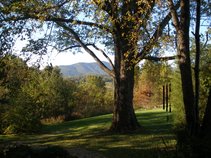
The morning was silk, soft on the skin, and just before dawn. The early spring air carried the season's first hints of warm moisture. A light breeze brushed my closed eyes, and a quiet but lilting birdsong began to tease awake the silence. In that brief moment between sleep and full lucidity, I felt a boundless peace that I hadn't felt for some time.
In the year leading up to this Easter Sunday in 1984, my wife Jackie and I had been fighting her leukemia. We had gone to Seattle for a bone marrow transplant. For someone her age and health and with a perfect donor match in her brother, Jackie's prognosis was good. We were going to beat this.
We were wrong. Jackie's transplant failed. We tried again. Failed. After 6 months of pain and radiation and dialysis and tubes and corpses hauled out on gurneys every day in this "research" center, a doctor shook his head somberly and told us there was nothing more they could do. Jackie sat propped up in her bed, her skin cracked and green, a urine bag hanging limply on a hook nearby. She gazed calmly at the doctor and, as was her style, analyzed the situation clearly and resolutely. She then said quietly, "Well, I certainly don't want to die here. I want to die in my home."
And that's what she did. We traveled back across the country to live out her life in our house in New Jersey. I was her nurse. Medical paraphernalia crowded every corner of our bedroom. We knew that she was going to die, but we didn't know when. So we spent the last three months of her life together in a surreal netherworld, somewhere between a life we had lost and death we could not know. Friends and family helped and watched.
Ordinary sounds and colors of life took on a menacing tone. Their simple beauty – which I was only now beginning to comprehend – stood in stark contrast to the horror we were enduring, enlarging and intensifying it. And I only knew the one Noble Truth: the suffering that had crept up incrementally, and that would soon come rushing headlong with terrible, overpowering force. If you're not ready for it – and I wasn't – it will gouge out a hole so deep inside that its vacuum sucks the breath out of your lungs and all reason out of your brain.
Two days before Easter, Jackie felt well enough to have dinner with friends. But her body finally said "no more." She lost bowel control at the dinner table, and I got her home before pain sent her into convulsions. Mercifully, she drifted into semi-consciousness. As the hours passed, I sat powerless, exhausted, numb. She held me with a look that was an odd blend of anticipation and uncertainty, but very nuanced, composed, unruffled. She no longer spoke, nor seemed to understand anything I said to her. She looked beyond me, and then she closed her eyes and began her death rattle. I feel asleep to that raspy sound.
Then, that Easter morning. Jackie lay beside me, quiet. At once, the sweet silence that had momentarily soothed me turned cold and real in its meaning: she was dead. In a panic, I reached for her arm. It was cold up to her elbow. She was gone, freed. The morgue truck took her body away.
In the ensuing years, I teetered on the brink of a bottomless maw in my soul, but dragged myself back to life by establishing certain truths as handholds. First: my young daughter Corey needed me. I had to survive for her. Second: the irony of suffering. We never seek it. We tremble at its approach. But every horror and degradation and shame that it visits upon you will yield in its wake – if you survive it – a strength grown out of a profound joy and understanding of the rhythms of life.
I didn't realize in those early days that as I finally drew free from the black hole inside me I was beginning to practice and understand the dharma. I would mouth cheery comments like, "hey, we're going to be dead before we know it!," not really understanding why others didn't find that humorous. Then, about a year ago, I found that the name of such existential insouciance was "dharma" and it is giving shape and direction to my own personal truths. Its simple tools – like seeing every single moment for the unadorned truth that it is – help daily living but, more importantly, are building a framework in which I'm learning how to coexist peacefully – even graciously – with that 800-pound gorilla named Samsara.

